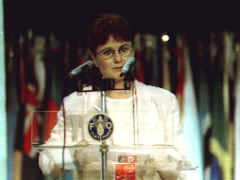


NORWAY - NORVEGE - NORUEGA | ||
Her Excellency Kari Nordheim-Larsen, Minister of Development Cooperation of Norway | ||

The World Food Conference held here in Rome in 1974 decided to eradicate hunger within one decade. We have not succeeded. Widespread undernutrition is not acceptable. Even to achieve the modest target set by the present Summit to reduce the number of undernourished people by half by the year 2015 requires political will and determination. If I should highlight one important result of the Summit it is the clear recognition of the right to food as a human right. I will, in accordance with our Plan of Action, urge the world community to urgently take the necessary steps to implement this right. The Declaration and the Plan of Action of the Summit recognize that governments must take the prime responsibility for actions in their own countries. National policies will have to put the interests of poor and starving people first. The international community has an obligation to support national efforts. The failure by rich countries to fulfil the United Nations target of 0.7 percent of GNP for official development assistance is unacceptable. I appreciate that the Summit document underline that food security is far more than food production and food supply. Food security includes economic growth and sustainable management of natural resources, nutritional diets and access to productive resources, not least for the poorest segments of the population, and other important elements of food security. Poverty is the major cause of food insecurity and offends human dignity. Our inability to attain the objective of poverty eradication is a discredit to our common political record and undermines our credibility. At the same time, environmental degradation and population growth threaten to disrupt the balance between people and resources. It is imperative to enhance the crucial role of farmers and their organizations if we are to obtain food security. Hence, increased investment in agriculture is needed, not least in the poorest developing countries. We must implement sustainable rural development policies that ensure stable food supplies and food security for all. Concerted action is needed to maintain and develop an active agriculture in developing and developed countries as well as in both low and high potential areas, and we must also recognize the multifunctional role of agriculture in order to benefit fully from its potential. The living marine resources may also contribute substantially to achieving food security, but this requires urgent combat against excessive fishing and recognition of international agreements and principles of sustainable management of the aquatic resources. In addition to domestic production, trade is a key element in achieving world food security. The terms of trade are decisive for the least developed and net food importing countries and I am pleased that the Summit signals special support to the poorest countries. I also appreciate that the important linkages between trade and environment are reflected in the Plan of Action. In general, our commitments made by the Uruguay Round Agreement form the basis for action in this field in the years ahead. Equality is a key to sustainable development through empowerment of people, both men and women. The role of women in achieving food security cannot be over-estimated. In many societies women are the main producers of food. Women must be given equal access to education, land, and other productive assets, as well as credit. Women are also the main providers of meals, nutritional information and in assuring improved nutritional status within households. Any strategy for improvement in food security will therefore have to take women's needs as a point of departure. In this respect, I am pleased that the Summit in Rome can confirm and reinforce the achievements of Cairo, Copenhagen and Beijing. This Summit takes place at a time when the United Nations as a whole is facing new challenges. The tasks at hand are immense, while financial support is eroding. To regain the support it deserves, reforms leading to increased efficiency and improved performance of the United Nations system is called for. Coordination at field level and cooperation between all agencies and the United Nations resident coordinators is imperative in order to implement the Plan of Action of the World Food Summit. Food security is a global challenge and responsibility. In the short term we need to prevent human tragedies such as those we witness in Africa at present. Those who suffer need our solidarity now. In the long term, a stable and peaceful world will depend on our ability to secure food for all. | ||
|
|
|
|

 |